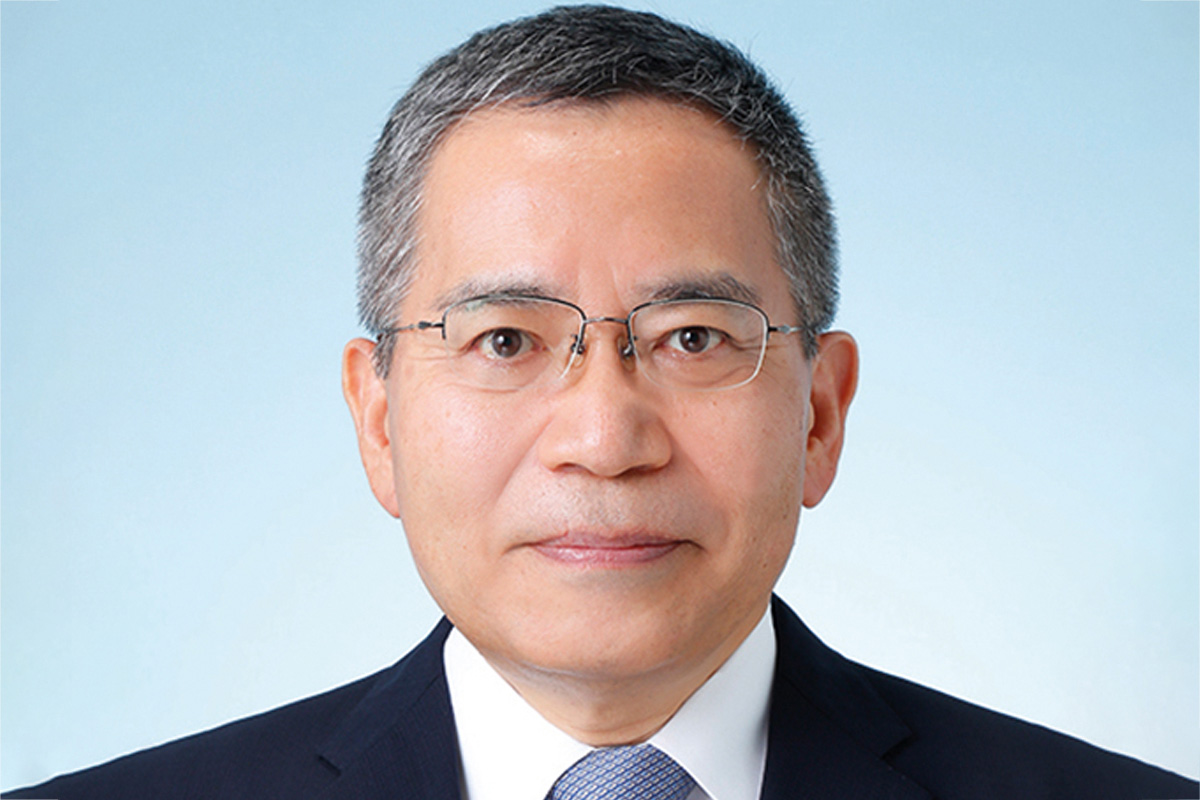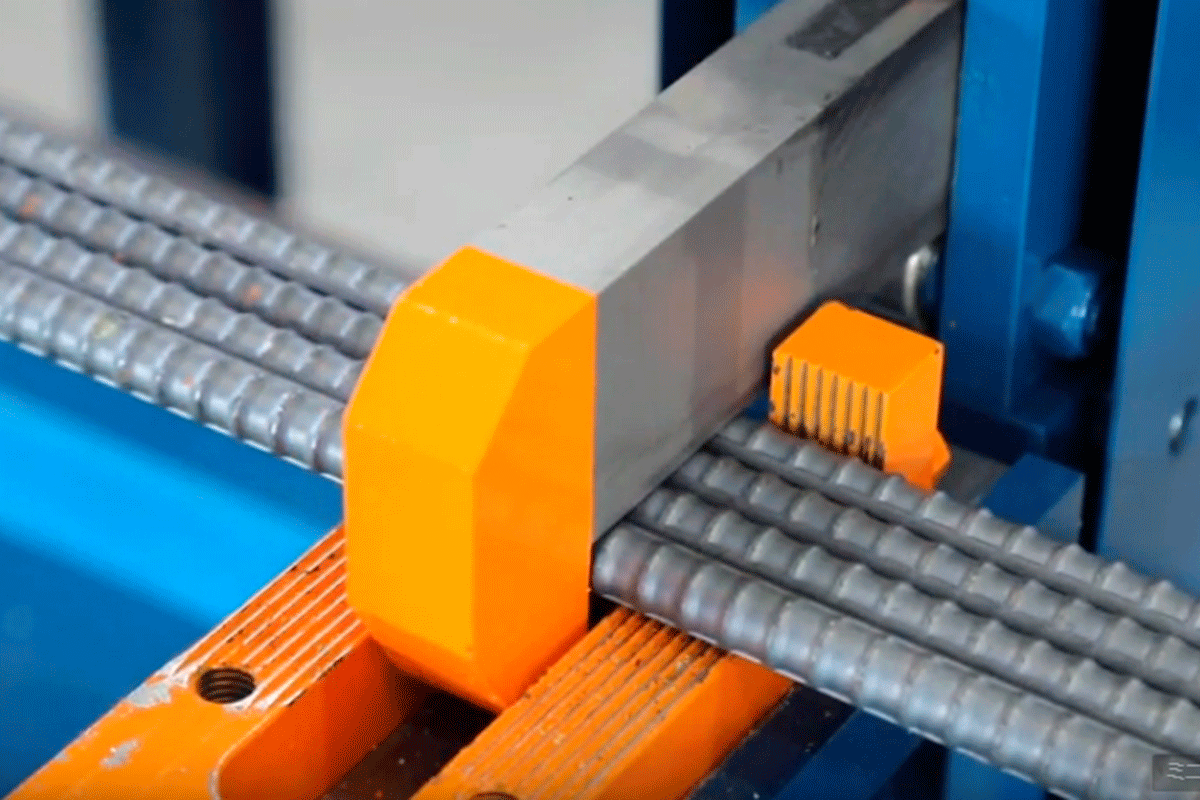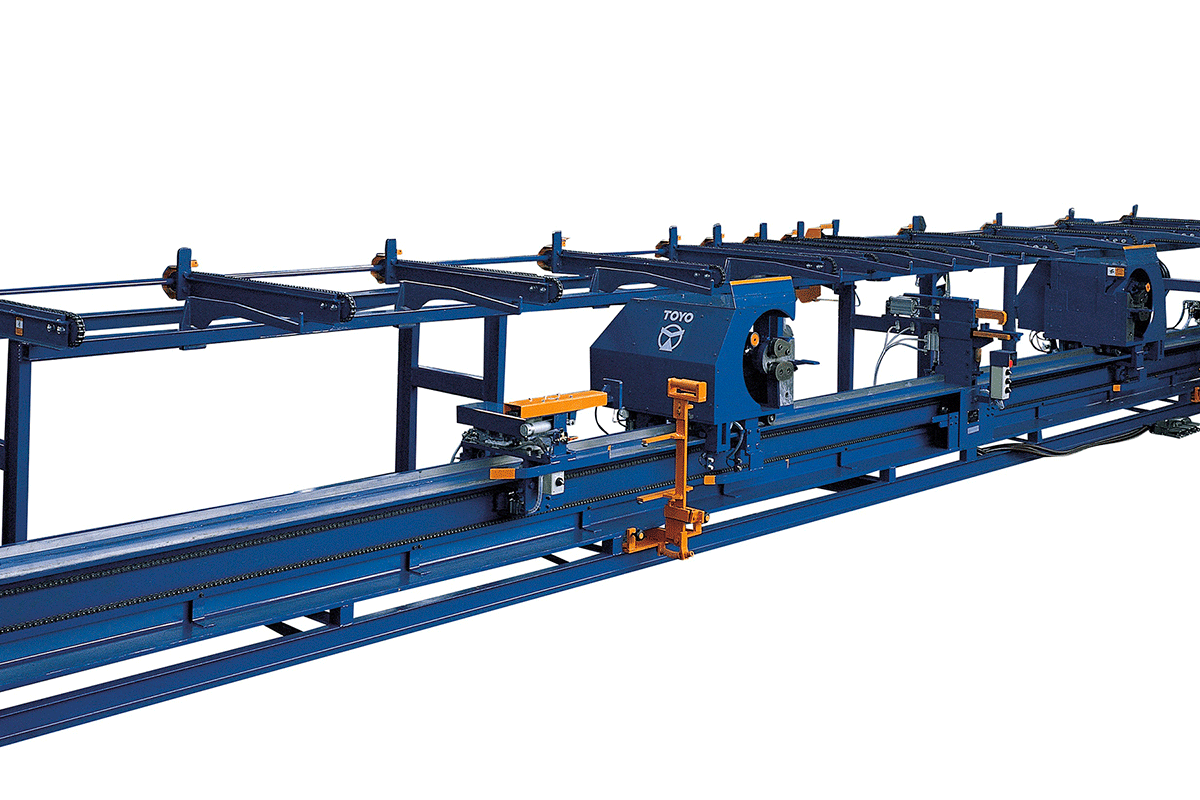Toyo Kensetsu Kohki values a client-centered approach by listening attentively and developing products and services that align with customer requirements.

Japanese firms like yours have been subjected to stiff price competition from Asian and Southeast Asian neighbors in recent years, especially when it comes to machinery or construction. Despite this very stiff competition, Japan still succeeds in high-mix-low-volume production, and Toyo Kensetsu is a great example of this with its 80% domestic market share. Additionally, if we look at your product lineup, 50% are custom-made for your client’s exact needs. Could you give us your take on why you think Japanese companies like yourselves have been so successful despite competitors in China, Korea, and Southeast Asia that are making much cheaper copies of similar machines?
We actually have that 80% share in the domestic market for many reasons and one of them is that we are a pioneer in terms of manufacturing rebar processing machines. We were the first company that produced rebar processing machines in Japan, but at that time we didn’t have a lot of knowledge in the architectural construction industry. Of course, when I say rebar I’m talking about reinforcement bars, metal bars that are used to reinforce the tensile strength of concrete. Once we started producing these machines, we started working together with our clients to come up with wanted developments, and on many occasions, we visited the client’s operations sites. This was to talk to customers, listen to their issues, and consult on effective and efficient solutions for the next iteration of our marque products.


The growth of Japan’s rebar industry is pretty much aligned with the growth in Southeast Asia as well as Japan. I know it might sound strange, but I think we are quite lucky that Japan is so susceptible to earthquakes, and because of these frequent natural disasters we have very stringent standards for construction. In other countries where there aren’t earthquakes or they occur less frequently, the standards are much lower. With those standards being so high in Japan, other countries simply cannot reach the level of quality we retain. This is how we were able to form our competitive edge in the Japanese market.
In the beginning, when we were founded, I believe there were actually a lot of other options that were made in other countries, but with the Japanese standards being so high we were able to beat out all that competition.
I think another relevant aspect relates to the consumer electronics industry. Recently some of the leading companies in this field have produced products with a wide range of functionality. Of course, this has raised the price of those products, and if we are frank, customers don’t necessarily want all these functions. While these firms were raising the level of their products, we saw the rise of competitors in South Korea and China which have focused on producing products at the cheapest price possible with only basic functionalities. In my opinion, this is why the Japanese consumer electronics industry was left behind, with the global competition steaming ahead. The country, unfortunately, suffers from Galápagos syndrome, with the products being produced in Japan only being demanded by the Japanese. On the other hand, in the rebar industry, consumers don’t just pursue cheaper prices. Quality and accuracy come first for the clients and price follows.
We always value our conversations with our clients, especially when we are developing something new. We don’t make unilateral decisions for new developments and I think that is how we’ve avoided Galápagos syndrome. The products we produce have a higher price when compared with our competitors, however, the accuracy and quality are higher and I think that is why clients continue to choose Toyo Kensetsu.
You may have heard of the term market-in, however, if you just look at the market as a whole you may not be able to see and hear the needs of individuals. We at Toyo Kensetsu prefer the term customer-in. If we pursue customer-in then inevitably that will lead to the market itself. We have a relationship with almost 100% of domestic rebar processing companies and we have 80% of the domestic market share, but I think if you add up everyone who has ever used, purchased, or inquired about our products then that is going to add up to almost 100%. That is because we try to listen to all of these different individual needs and once we are able to understand these individual needs, that will translate into the market as a whole.
We used to focus on manufacturing methods and marketing strategies, but now we have also added a focus on services such as repair, maintenance, and the supply of components. We have bases that cover all of Japan and we are able to provide these services through these domestic channels.
Japan’s current demographic shift is having a big effect on construction in particular, where currently one in four workers is over the age of 65. For the rebar industry, 80% of rebar processing was done on-site in the 1980s, whereas today, more than 95% is done in factory locations. Japan has developed a lot as an economy during this time. Do you expect the same situation to occur in other countries such as in Southeast Asia?
This shift will happen in other countries, but I will say that transformations in those countries don’t easily happen. Once it starts happening, however, the change will be swift. This happened in Japan between 1980 and 2000. In those 20 years, Japan changed a lot and I think the change in Southeast Asia will take place in a much shorter period of time.
We saw a shift from on-site fabrication to off-site fabrication of rebars in Japan because of one single machine that we produced. In the past carpenters used to bend the rebar on-site, one by one with their tools, so we developed an automatic processing machine back in the 1980s, which by the way is very close to the machines we sell to this day. Thanks to this machine we were able to process rebars more efficiently. Saying this, at the time we couldn’t imagine that we would use this at a factory off-site. Operators found the machine to be highly efficient, so an idea was floated to use it at a fabrication factory off-site rather than on-site. When this was seen as successful there was a rapid shift industry-wide to off-site fabrication. I think this kind of transformation should happen in Southeast Asia as well.
The equipment is already available, especially our equipment, which is already in locations like Southeast Asia. If they would invest in those machines I believe that they can make this transformation happen, but for this to happen they need motivation for change.
We refer to this shift as the Big Bang of the rebar industry, and we really don’t want to miss this occasion. Having said that, it doesn’t happen if we sit and watch. We’ve watched the movement in these countries for more than 10 years now but nothing has changed. We believe that rather than just providing equipment we would also like to propose processing methods and operation processes so that these countries can have their own rebar Big Bangs.
You mentioned there that 100% of domestic rebar processing companies have at some point used your equipment, so obviously you have very good business relationships domestically. Relatively speaking, Japanese companies working with other Japanese companies is quite a straightforward process, but should you go overseas, that is a different mindset altogether. Standards, languages, and cultures are all very different, especially when compared to Japan. What steps do you take to ensure that you adapt to these local mindsets when it comes to doing business overseas?
If we were able to find that secret sauce that makes communication easier and smoother then we would have generated 10 times more revenue than we have. As you know, these things aren’t easy because as you mentioned, people are different. Cultures, languages, prices, standards, accuracy, and an endless list of other things all need to be weighed into account when doing business abroad. It just isn’t easy at all, but speaking of our global business department we do have people from China, South Korea, Vietnam, and India. We would like to combine these different backgrounds so that we can bring synergy to our global business.
When we go overseas we promote the accuracy and the quality of our products. One point in particular we stress is to rebar processing companies, stating that we can help them reduce the loss of rebars. The Japanese standard for loss is around 2%, however, when we have visited other countries we have seen rates as high as 10% or more. We try to talk to presidents of rebar processing companies and explain that our products can help them with their losses. Even if the price is higher when compared to competing products, the loss reduction will actually make them much more cost-effective. Not all presidents agree, however, and they believe there is no loss out of their processing. When the presidents of those companies go to visit the construction sites they don’t find any scrap material. The laborers actually bring the scrap home as part of their compensation. With this, you now have a new problem where those workers don’t want to introduce machinery that reduces scrap because they like to take it home. This is an example of the kind of cultural background that we need to understand when we do global business.
Your rebar machines are used to process foundations for houses and one thing we are seeing in the construction industry these days is off-site, modular construction-based techniques where whole sections of walls or roofs are built off-site and then brought on-site to be connected. With this trend taking place is this an opportunity for your business or are there some challenges involved in this new approach from the construction industry?
I think there are both opportunities and challenges there. Speaking of the housing construction industry, our biggest clients are the rebar processing makers and the others are the concrete makers and the companies that deal with foundations for housing. We have had a business relationship with these clients for some time now and in the past, and typically when you build a house you put stones on the ground and then place a wooden framework on it. However, recently there has been a tendency to just place the foundation flat first with concrete, and then put the rebar inside the concrete.
With Japan’s aging demographic we are finding that there is a shortage of labor, especially in construction-related industries. As a side effect, it is becoming more difficult to send someone to do on-site fabrication, and this is why we are promoting off-site fabrication. Our company deals with rebars, and as such we don’t deal with wooden materials. With concrete, whether they do the fabrication on-site or off-site there is a need for rebars, so in that sense, I think housemakers will become important clients going forward.
Toyo Kensetsu has been working with a company called Progress since 2017; you are an exclusive distributor for them here in Japan and they do precast concrete and rebar-based digital solutions. In your opinion, what digital tools will revolutionize the construction industry?
DX in the rebar industry is actually something that is very hard to imagine, but at the same time, it is something that we must pursue. Looking into the construction process in Japan there are different phases and essentially these phases are independent of each other, so it becomes a difficult process to oversee everything all at once. Additionally, a lot of these operations are still quite analogous, but despite that, we are able to produce high-quality houses and buildings. With the shortage of workers, however, this is under threat and we need to change the way we do construction. In the past we have tried to automate the rebar process of construction, however, unless we were able to take over the automation from end-to-end then we were not able to achieve true efficiency.
The rebar industry is quite independent and even general construction companies have very little understanding. Once an architectural design is made, rebar companies then show on the diagram where rebars need to be placed for the foundation and the company will also calculate the required number of rebars. This is how we came up with an idea like BIM for the management of the whole process. DX honestly is something that we really can’t avoid and it is inevitable. Unfortunately, there is resistance from the rebar industry as they really don’t want to be too transparent with general construction companies, especially for financial matters.
In order to achieve these digital transformations we need to remove some of the analog tasks we still retain, and that is why we decided to promote Progress. That company is able to do precast concrete which can then be sent to construction sites. With this kind of system in place, we can promote end-to-end automation. Back on May 24th to 26th 2023 we joined the CSPI-EXPO which was held in Makuhari. Almost 50,000 people attended this Construction and Surveying Productivity Expo and we set up a booth there. That booth was a joint one where we showcased two machines for automation that were produced through collaboration with other companies. We also used the space to showcase the work that Progress is doing. Honestly, the response was much better than we anticipated and I think it is because many companies out there are anticipating DX from the construction industry as a whole.
You mentioned earlier how you’ve developed the ability to offer clients follow-up services where you come on-site and do maintenance as well as provide components to fix those machines. You’ve obviously established a great network here in Japan in order to do that. If you were to offer these services overseas would you need partnerships to ensure that customer services? Are you open to collaborations with companies outside of your rebar group overseas?
Right now we don’t have any plans in place for a specific partnership but whenever we have an opportunity we don’t hesitate to go for it.
Imagine that we come back 6 years from now and have this interview all over again. How would you like your company to be seen globally by the time we come back for that new interview?
I think that all human beings have the right to live in safety in the comfort of a safe building. I hope that by the time you come back for another interview, we have helped more people live in safe buildings in the global market. To that end, I believe we are making every effort we can to make this happen.
0 COMMENTS